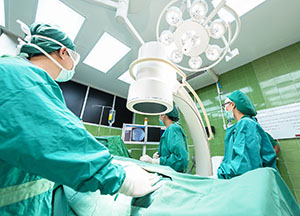President of Mansoura University holds a meeting to follow up on the electronic reservation system for outpatient clinics in hospitals and medical centers
- Hits: 465

On May 15, 2024, Prof. Cherif Youssef Khater, President of Mansoura University, held a meeting with the Committee on the Electronic Booking System for Outpatient Clinics of Hospitals and Medical Centers via the Internet.
This came in the presence of Prof. Mohamed Abdel Azim, Vice President of the University for Community Service and Environmental Development Affairs, Prof. Mohamed Attia Al-Bayoumi, Vice President of the University for Education and Student Affairs, Prof. Ashraf Shoma, Dean of the Faculty of Medicine and Chairman of the Board of Directors of University Hospitals, Prof. El-Shaarawy Kamal, Executive Director of Hospitals and Medical Centers, Dr. Mahmoud Saafan, Deputy Director of Intelaq Company for Communications and Information Technology, Dr. Amr Samir, Director of Digital Transformation at University Hospitals, Dr. Mohamed Matar, Director of the Measurement Unit at the Measurement and Evaluation Center.
Prof. Cherif Youssef Khater said that the political leadership pays great attention to developing the university hospital system and the digital transformation of services provided in the medical sector to citizens in light of the state’s strategy to achieve sustainable development, which reflects Egypt’s Vision 2030, pointing to the success of the electronic system for booking outpatient clinic tickets online for hospitals and medical centers, to meet the needs of citizens to book clinics digitally and prevent crowding.
During the meeting, he also directed to activate the electronic follow-up reservation system in general in hospitals during the coming period, with multiple payment systems for follow-up and the existence of two payment systems (treasury payment - Fawry).
The activation of the electronic call system for doctors from various specialties was also discussed, which is the first electronic system in Egypt for calling doctors to meet the needs of hospitals to examine patients from other specialties. The experimental operation of the system will begin from June 15 until June 30.
Activating evening clinics was also discussed due to the high demand for some clinics to accommodate the increasing numbers of patients.
Prof. Mohamed Abdel Azim praised the efforts made in operating the electronic reservation system in hospitals and medical centers, making it easier for the patient and reducing crowding in hospitals, as well as the positive outlook of patients on the reservation system in making it easier for them in Dakahlia and the Delta governorates, and providing medical services without trouble or difficulty in booking examinations in external clinics.
Prof. Ashraf Shouma said that the system has proven its efficiency in developing the provision of medical services in the university’s medical system, which comes within the framework of the efforts of the university and the medical sector, to raise the level of quality of medical service for all citizens and facilitate access to it through mechanization and digitization of these services.
Prof. Al-Shaarawy Kamal said that what has been achieved in all hospitals so far reflects the efforts made for the success of the electronic reservation system and the ability of the medical system to transition to electronic systems.
Dr. Amr Samir reviewed the report on the electronic reservation system in hospitals and medical centers since its implementation till now, and the rate of electronic reservations has increased to more than 500000 reservations, indicating that many problems related to the operation and efficiency of the reservation system that were discussed during the previous period have been solved.
Dr. Muhammad Matar also reviewed the results of opinion polls for service users, including patients, and service providers, including doctors, nurses, and administrators, about the electronic reservation system, its effectiveness, and problems related to it.








